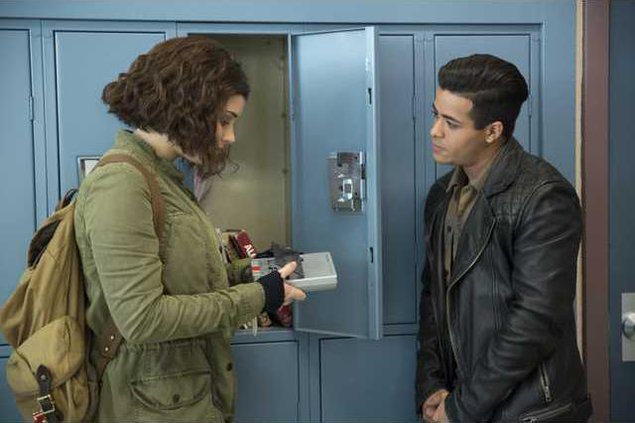The Parents Television Council said Netflix needs to do more to protect children from 13 Reasons Why.
The conservative media watchdog group said in a statement on Wednesday that it applauded the shows attempt to protect viewers ahead of its second season, including airing a warning video before the season's premiere.
But the PTC said it wants Netflix to do even more.
In a lengthy statement, PTC President Tim Winter said Netflix should hold on sharing the new season of the show slated to be released sometime this year until experts give it the OK.
When a film or TV series centers entirely on high school-aged children for its storytelling, it is high school and junior high school children who watch and who feel most emotionally connected to the characters," Winter said. "Grown-ups don't put themselves into the position of high schoolers; but other children do."
The PTC also wants Netflix to implement a payment structure akin to SiriusXM Satellite Radio, which allows subscribers to opt out of adult or explicit programming in exchange for a reduction in the subscription price, Winter said.
Winter added he hopes Netflix will work with movie filtering companies such as VidAngel, which allow consumers the ability to filter explicit content from the entertainment they stream inside their homes.
The PTC wants Netflix to be a "positive resource" for its users and to help identify protective measures for children and families.
Parents may believe that Netflix is safer for their families than other forms of entertainment, but the reality is that it is not. Parents need to be aware of 13 Reasons Why, and this insidious digital media culture that is engulfing our children and teens, Winter said.
Netflix announced in late March that it will add a warning video before the second seasons premiere that warns viewers about the dangers of suicide, according to the Deseret News. In the video, cast members from the show talk about how its a real-world issue.
If you are struggling with these issues yourself, this series may not be right for you, or you may want to watch it with a trusted adult, says Alisha Boe, who plays Jessica Davis on the show, in the video.
The first season received a heavy amount of criticism over its depiction of suicide, according to BuzzFeed News. In fact, Brian Wright, Netflixs vice president of original series, told BuzzFeed News that he didnt anticipate having criticism on such a large scale.
We didnt know in season one that the conversation was going to be this big, Wright said. What were doing now with the lead-up to launch is working with organizations all over the globe, mental health organizations, and school counselor organizations to make sure that people are armed with information and ready for these conversations.
Utah suicide expert Greg Hudnall said parents shouldnt let their children watch the show.
I'm all about educating people on prevention, he told the Deseret News in a phone interview. I'm all about suicide prevention. What I'm not about is sensationalizing suicide.
The conservative media watchdog group said in a statement on Wednesday that it applauded the shows attempt to protect viewers ahead of its second season, including airing a warning video before the season's premiere.
But the PTC said it wants Netflix to do even more.
In a lengthy statement, PTC President Tim Winter said Netflix should hold on sharing the new season of the show slated to be released sometime this year until experts give it the OK.
When a film or TV series centers entirely on high school-aged children for its storytelling, it is high school and junior high school children who watch and who feel most emotionally connected to the characters," Winter said. "Grown-ups don't put themselves into the position of high schoolers; but other children do."
The PTC also wants Netflix to implement a payment structure akin to SiriusXM Satellite Radio, which allows subscribers to opt out of adult or explicit programming in exchange for a reduction in the subscription price, Winter said.
Winter added he hopes Netflix will work with movie filtering companies such as VidAngel, which allow consumers the ability to filter explicit content from the entertainment they stream inside their homes.
The PTC wants Netflix to be a "positive resource" for its users and to help identify protective measures for children and families.
Parents may believe that Netflix is safer for their families than other forms of entertainment, but the reality is that it is not. Parents need to be aware of 13 Reasons Why, and this insidious digital media culture that is engulfing our children and teens, Winter said.
Netflix announced in late March that it will add a warning video before the second seasons premiere that warns viewers about the dangers of suicide, according to the Deseret News. In the video, cast members from the show talk about how its a real-world issue.
If you are struggling with these issues yourself, this series may not be right for you, or you may want to watch it with a trusted adult, says Alisha Boe, who plays Jessica Davis on the show, in the video.
The first season received a heavy amount of criticism over its depiction of suicide, according to BuzzFeed News. In fact, Brian Wright, Netflixs vice president of original series, told BuzzFeed News that he didnt anticipate having criticism on such a large scale.
We didnt know in season one that the conversation was going to be this big, Wright said. What were doing now with the lead-up to launch is working with organizations all over the globe, mental health organizations, and school counselor organizations to make sure that people are armed with information and ready for these conversations.
Utah suicide expert Greg Hudnall said parents shouldnt let their children watch the show.
I'm all about educating people on prevention, he told the Deseret News in a phone interview. I'm all about suicide prevention. What I'm not about is sensationalizing suicide.

